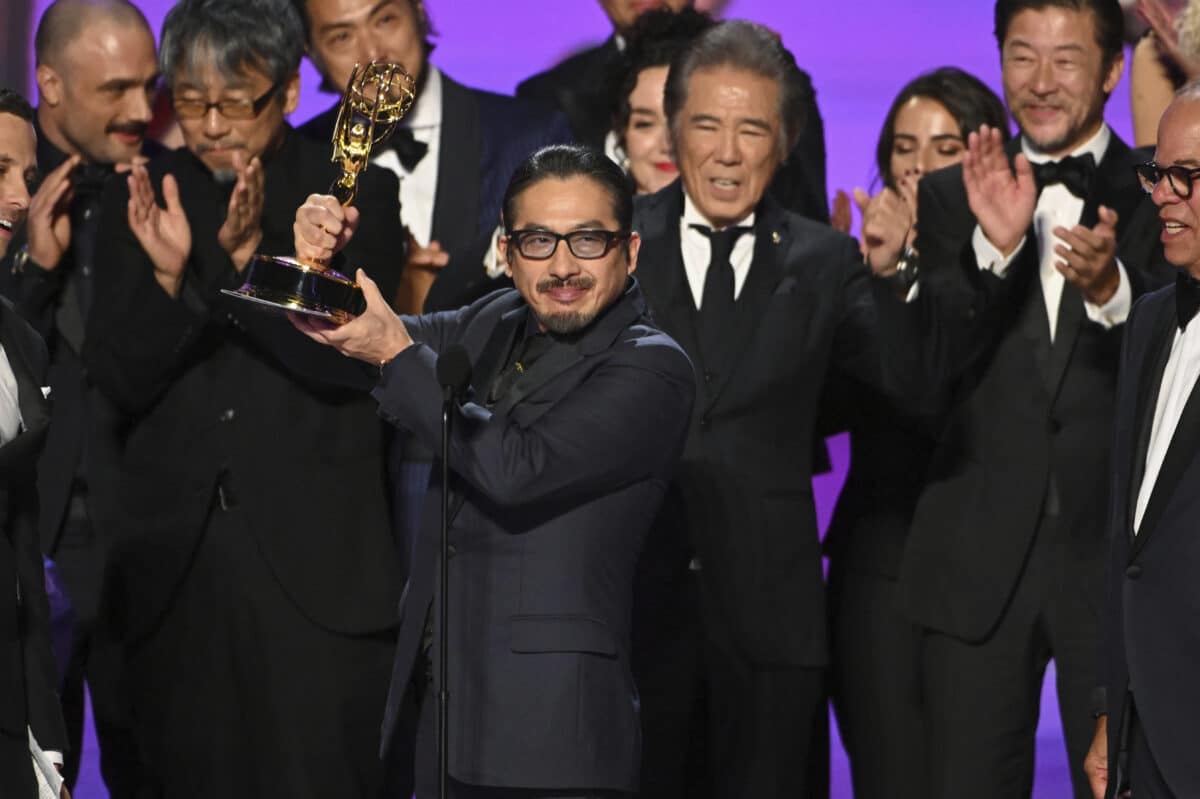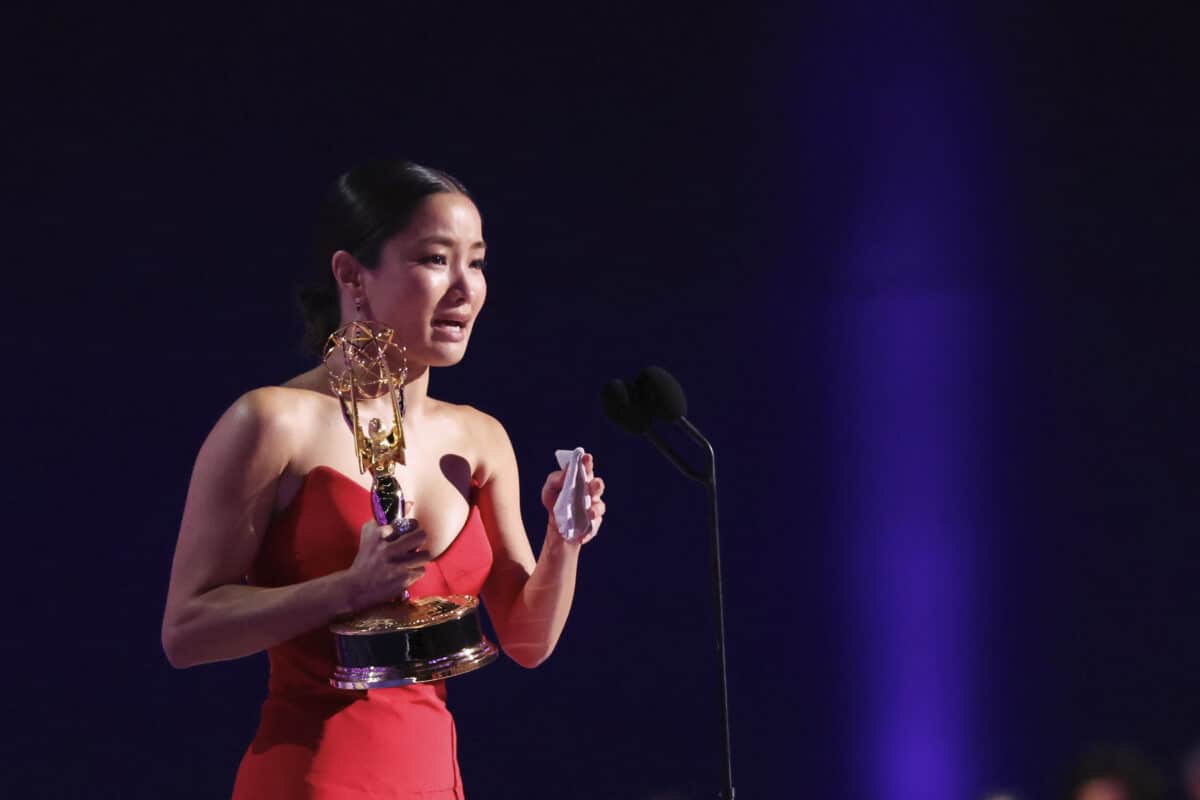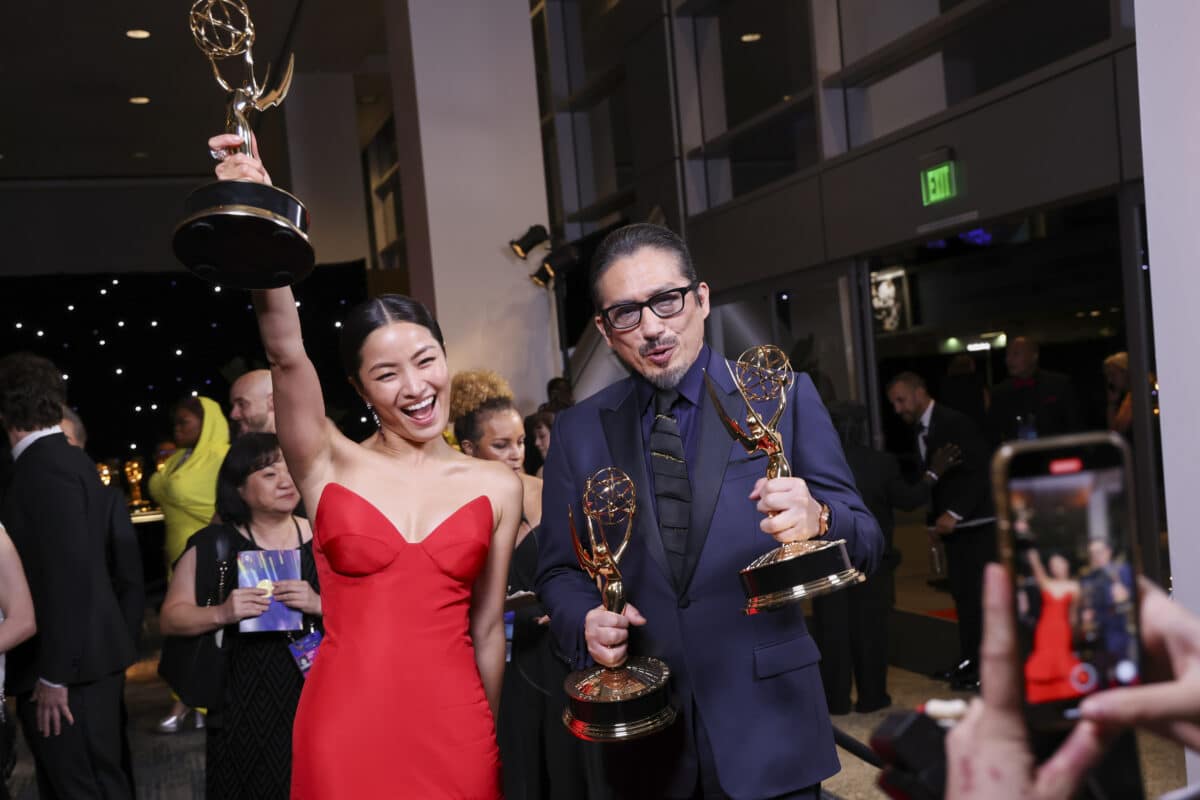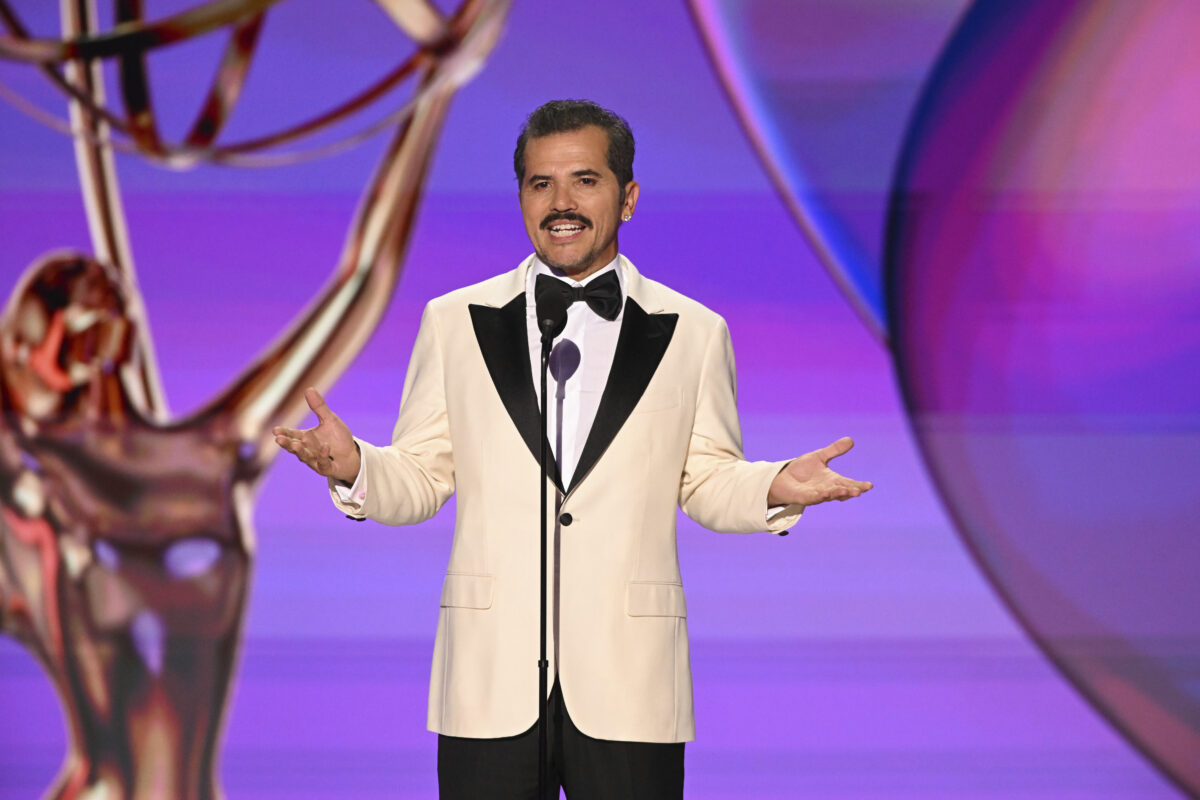Emmys’ ‘Shogun’ blurs the line – Is that good?

FILE PHOTO: Hiroyuki Sanada, center, and the team from “Shogun” accept the award for outstanding drama series at the 76th Emmy Awards on Sunday, Sept. 15, 2024. (Photo by Phil McCarten/Invision for the Television Academy/AP Content Services)
Did the Emmys blur the line for the good last weekend?
Nielson said 6.7 million people in the US watched the show and if you did, were you wondering if “Shogun” was American or Japanese?
The Oscars do have a “foreign” or “international film” category. But in 2019, “Parasite,” a South Korean movie, was the first to win for both best foreign and best film.
And perhaps that’s the way it should be. Good is just good? Until politics gets in the way.
Or maybe it’s money? When it debuted in 2024 the show got 9 million views in its first six days of release.
If we’ve broken out of the foreign/mainstream thinking, does that mean we’ll just award the best for being the best?
If so, does that mean maybe next year we’ll see “1521,” Producer Francis B. Lara-Ho’s project about Lapu-Lapu’s killing of Magellan and now streaming on Apple TV, honored by someone?
The “Shogun” example, however, brings up another blurry issue.
Are we Asian or Asians in America?
When it comes to media – from movies and TV to serious news – awards shows are always about representation. We have learned to ask, “Are Asian Americans present? Are we included?”
Since Filipino movies and actors are rare, we move to the generic and go to Asian American.
Real Asian Americans, that is.
So after the Emmys on Sunday, what do you do about Anna Sawai? Born in New Zealand, raised in Hong Kong and the Philippines, now living in Tokyo, she’s the hottest dramatic actress in TV and streaming after winning for best dramatic actress in “Shogun.”

Anna Sawai, winner of outstanding lead actress in a drama series for “Shogun” at the 76th Emmy Awards Governors Gala Winners Circle on Sunday, Sept. 15, 2024 at the LA Convention Center in Los Angeles. (Photo by Danny Moloshok/Invision for the Television Academy/AP Content Services)
She was wearing a Vera Wang gown. Does that make her an American?
For that matter, what is Shogun’s Hiroyuki Sanada, who won for Lead Actor in a Drama series? Asian American? He made a nice remark about the “miracle” of an “East meets West” dream project.
And it was. But the “Shogun” stars are Asians playing fictitious historical Asian roles. At best, they are Asians in America.
Does it matter? In a way, yes.
As Asian Americans, we are always fighting the “perpetual foreigner” stereotype.
“Shogun” is great drama with its 18 Emmy wins, but you know there will be some who won’t look at it as simply art.
These centuries-old stories about our ancestral homelands give opportunities for Asian actors, and that’s great. The old NBC version had the white Richard Chamberlain as the star. That’s not “yellow face.” That’s just white-faced marketing. This current “Shogun” has a touch more authenticity.
But it’s Asian, not Asian American.
You know the distinction. The great Greta Lee was up for an Emmy for her role as the TV exec in “The Morning Show,” but did not win. That’s an Asian American role. She also bridged East and West with last year’s “Past Lives,” truly a great film about immigrants and immigration that should have won an Oscar.
And then there was “Joy Ride,” overlooked by awards shows, but a film that raucously told the tale of a Chinese American adoptee seeking her real parents in China.
It’s not “Shogun,” it’s American. Asian American. We need more of those stories.
Last year, we had a tremendous Emmy year with “Beef,” the ode to bad Asian American driving. Steve Yeun (born in South Korea, but an American actor) was only presenting last night, so we naturally want to claim both Sawai and Sanada.

Anna Sawai, left, and Hiroyuki Sanada pick up their official Emmy statuette for outstanding lead actress and actor in a drama series for “Shogun” at the 76th Emmy Awards Trophy Table on Sunday, Sept. 15, 2024 at the Peacock Theater in Los Angeles. (Photo by Mark Von Holden/Invision for the Television Academy/AP Content Services)
But we do so cautiously.
Remember that we live in a world where people get so riled up over China that Asian Americans in academic positions have been accused of being Chinese spies. Foreigners.
It’s a never-ending problem for us. But I hope things are getting better. I wrote this column in 2016 when Alan Yang, who won the Emmy as the producer/creator of “Master of None,” told the vast TV audience we still had a long way to go for inclusion.
“I know we can get there; I believe in us. It’s just going to take a lot of hard work,” Yang said in his Emmy acceptance speech. “Asian parents out there, just a couple of you get your kids cameras instead of violins, we’ll be all good.”
John Leguizamo is a DEI hire
Inclusion was highlighted at last night’s Emmy show that had surprisingly few political moments. One winner, Liza Colon-Zayas of “The Bear,” did remind everyone to vote. But no one gave passionate speeches about the existential nature of this election.
Still, if you doubt the importance of the stories that come streaming out of our TVs, Candice Bergen of “Murphy Brown” fame appeared as a presenter and took note. She talked about being attacked in 1991 by then-Vice President Dan Quayle when her fictional character decided to have a baby and raise it as a single mother.
“Oh, how far we’ve come,” said Bergen. “Today, a Republican candidate for vice president would never attack a woman for having kids. So, as they say, my work is done…Meow.”
That last bit for the childless.
The only other real political statement came from actor John Leguizamo, who made the point that he was a DEI hire. Like Kamala Harris?
“D is for diligence, the E is for excellence, the I for imagination,” Leguizamo said. “So we are DEI hires and what a beautiful and diverse room [this is].”
But it could always be better.

John Leguizamo speaks onstage at the 76th Emmy Awards on Sunday, Sept. 15, 2024 at the Peacock Theater in Los Angeles. (Photo by Phil McCarten/Invision for the Television Academy/AP Content Services)
Leguizamo went over how whites used to play brown people, like when Marlon Brando played a Mexican in “Viva Zapata!”.
He didn’t go into Asians, but we know all too well about our “whites in yellowface” indignities.
Leguizamo lauded the Hispanics who were winning and being nominated like Colon-Zayas and Nava Mau, the fourth trans person nominated in history and the first for best supporting actress in a limited series for “Baby Reindeer.” It wasn’t enough.
“We need more stories from excluded groups,” he said. “Blacks, Asian, Jewish, Arab, LGBTQ+, and disabled.”
We’re making progress, but we need more, Leguizamo said as he displayed a full-page ad he bought in the New York Times where he made the point. And he didn’t leave out Asians in the ad.
It was a nice unifying call for inclusion that you rarely see in show biz. The bottom line: We all still don’t show up as much as we should in all media. And everyone notices as the world’s demographics change and the media stays white.
Leguizamo’s lesson: It’s better when we have each other’s back. And try to do something about it together.
Citizen Fang
My friend Ted Fang died last week at age 61. He’d always call me out of the blue. It was his style. “Dude,” he would say. And then we’d pick up from the last time, however long ago that was.
This time a mutual friend connected and told me he had passed. If only he had taken my advice to go vegan.
If you don’t know Ted, he was the last surviving son of the Fang family (John and Florence) of San Francisco, the first Asian American family to own a major metropolitan daily newspaper in America (the San Francisco Examiner).
How that happened was all Ted’s negotiations, going up against the Hearst Corporation and emerging as “Citizen Fang.”
The family, led by Ted’s father John, who came from Taiwan as a penniless immigrant, and his mother Florence, owned a tiny printing press in San Francisco that published some small local newspapers and one ethnic paper, Asian Week, the first national English news weekly on Asian American issues.
In 2000, the Hearst Corporation wanted to buy the major morning daily newspaper, the Chronicle, but an antitrust suit blocked any sale because the Hearsts already owned the afternoon Examiner.
Ted Fang brokered the only deal a judge would approve. The Hearsts were allowed to buy the Chronicle, but only if they sold the Examiner to the Fang family for $100, (that’s not a typo) and a $66 million, three-year subsidy from the Hearst Corp to run it.
$100 for an old afternoon daily, and $66 million?
Sounded like a sweet deal. But it wasn’t. Newspapers hemorrhage money. And afternoon papers are the worst. Even 24 years ago, the newspaper business was imploding. Once the Fangs took over, the paper never gained traction. The subsidy was not enough to sustain publication.
I was hopeful that the Examiner could make a go of it. But I stayed at Asian Week and wrote my Asian American columns on deadline.
The Examiner floundered and died. It saw how expensive it is to run a major daily. You burn through $66 million quickly.
Before he died, Ted was working with AI engineers to make Asian Week’s database available to researchers interested in the historical record of our national AAPI community.
Here was the first column I wrote for Asian Week in 1995, nearly 30 years ago. It’s my defense of Connie Chung when she hit an infamous rough patch with Newt Gingrich’s mother.
(It was 30 years ago on deadline. Forgive me my press passes).
The Fangs were what passed for Republicans in San Francisco. Conservative democrats. They cozied up to the rich and powerful. Birthday parties for Mrs. Fang would routinely bring out the politicians like Willie Brown.
Ted was slightly more liberal. He was gay and was an active member of the SF LGBT Center and in the effort to fight Hep-B. But when he took over Asian Week, he was focused on making it the Pan-Asian voice that his father, John, believed in.
I was a columnist there from 1995-2010 and when Ted was at the helm, he never told me what to write or how to say it. He always allowed me to be true to my voice.
From an editor/publisher, that’s all a columnist could ask for.
Good night, Teddy Fang.
Emil Guillermo is a journalist, commentator, and standup perfomer. He writes a column for the Inquirer.net’s US Channel. He does a micro talk show on www.YouTube.com/@emilamok1. He’s on X@emilamok. Contact: www.amok.com.

